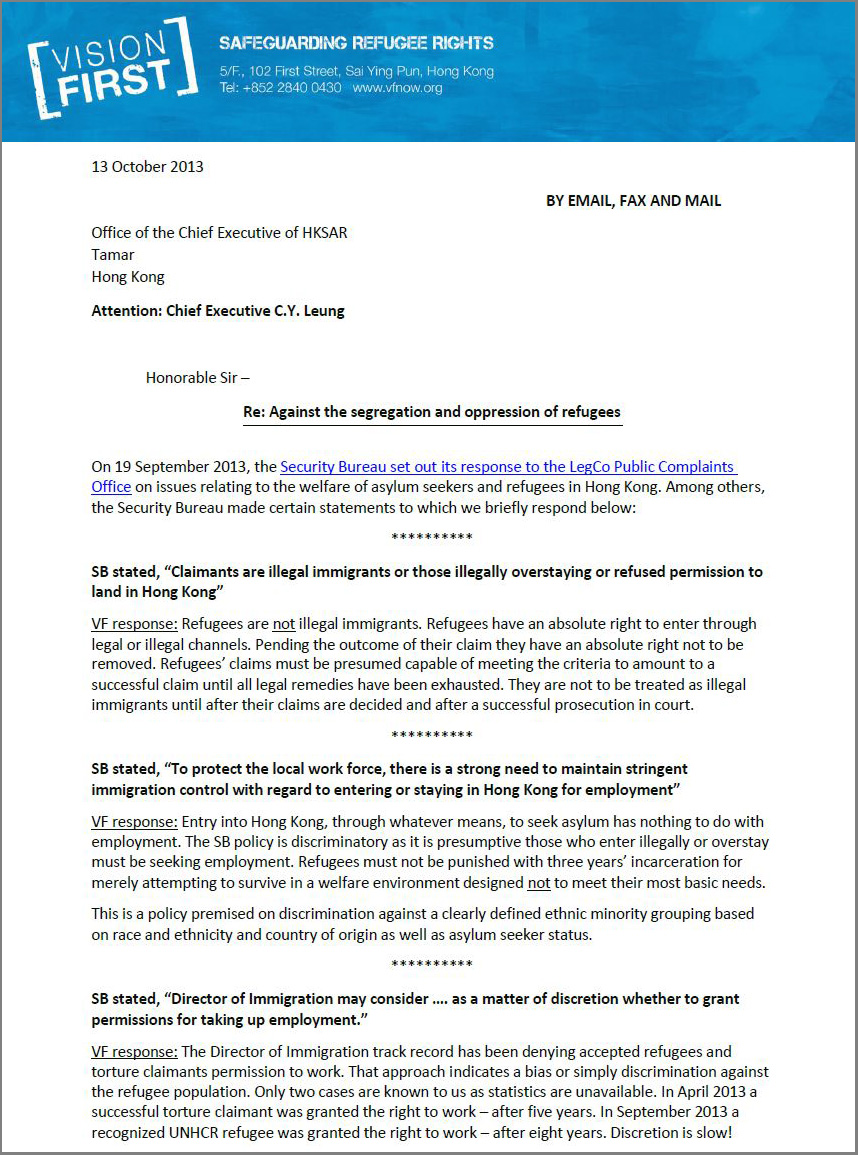VF commend refugees for sharing stories with world
Dec 20th, 2014 | Advocacy, Crime, VF Opinion | Comment
Outspoken refugees are on a writing spree. Many of Vision First’s recent blogs featured our members sharing experiences of deprivation and destitution in Hong Kong, the latter remarkably a condition that the HK government supposedly aims to prevent by providing ‘in-kind’ humanitarian assistance.
The latest of these blogs, Rashid’s testimony of suffering at the hands of ‘the law system force refugees to do crime’, shines a spotlight on a problem that few ever raise despite it being well known.
Several questions spring to mind. Is the government hiding behind a humanitarianism smokescreen to undermine refugees’ civil rights and effectively force deprivation upon them? Is there a covert goal to raise their visibility in the criminal justice system? Do welfare strategies cunningly reinforce propaganda depicting refugees as undesirable illegal economic migrants and criminal abusers?
Rashid’s story raises a number of problems that we believe ought to be urgently addressed by the authorities.
First, upon release from detention ‘humanitarian’ assistance isn’t available for several months, which increases the vulnerability of newly arrived refugees to economic abuse and exploitation. “A middle-class dog is treated better”, Rashid astutely observes. For weeks he slept rough in a public park, deprived of basic accommodation he could not afford on his own after agreeing with Immigration he would not work.
Second, talented refugees are turned into beggars and ‘terrorist-looking’ individuals, a dehumanizing process that arguably raises their categorization into a homogeneous group enclosed by clearly defined boundaries that set them as extraneous bodies in a wealthy global city where rightful residents are expected to be self-reliant.
Third, excluded from society, refugees are mentally tortures, deprofessionalized and deprived of their liberty. They are unlawfully detained in a “walking prison”, Rashid plaintively laments. Government control capacity has expanded in late modernity to a point that it need not lock people up anymore. Instead, states may exclude undesirable behaviour by creating labels that immediately cast bearers as outcasts, forcing their marginalization and surveillance.
Fourth, Rashid’s story is exemplar in that he perceptively understands the causation of the resultant problems. “Is the law fair?” he ponders distrustfully. While he certainly wants to believe so, he mournfully notices that it is indeed the law and its implementation that force refugees to find their way out of an untenable situation by seeking personal survival through legal or illegal ways.
Shackled by the twin chains of inadequate welfare and work ban, refugees speak of an ugly reality nobody dares to cast in the spotlight. Such an inconsistency cannot be ingenuously unplanned. Meanwhile an entire generation of people is lost to crime, crushed by the wheel of a repressive justice system. Why is this happening?
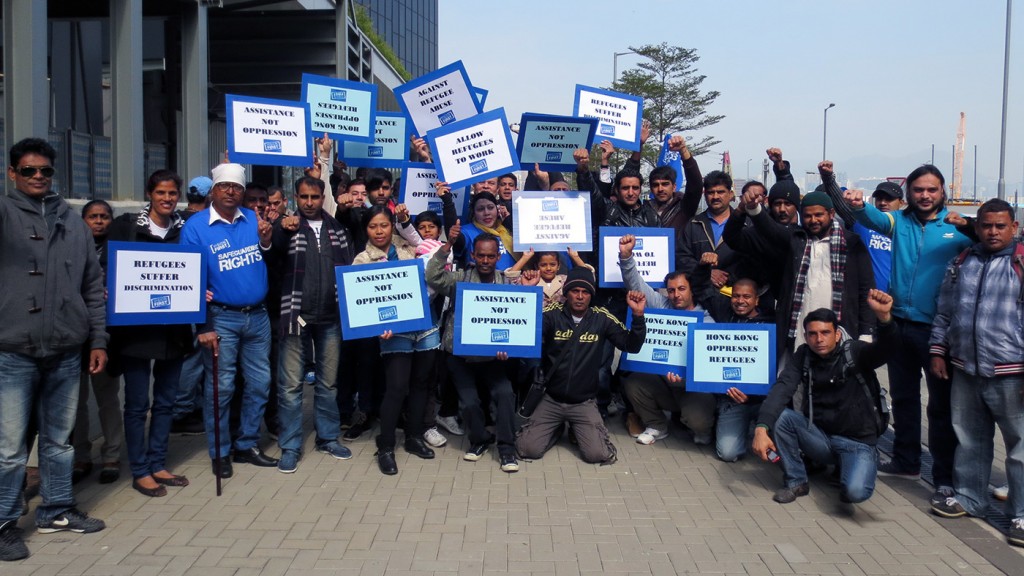
Comments to SWD replies to enquiries to tender
Dec 11th, 2014 | Advocacy, Food, Housing, VF Opinion, Welfare | Comment
On 3 December Vision First sought SWD clarification on the following points after we were invited to the tender. Vision First finds these replies largely unsatisfactory.
Comment to A.1
We question whether SWD is mistaken by operating on the assumption that refugees seek their own accommodation. SWD echoes the views previously heard from ISS-HK that the majority of refugees living in slums choose to live there and don’t want to move out. While it is true that nobody is coerced to make a home in the slums, huts were and continue to be the only locations rentable at the price point offered to refugees (currently 1500$ a month). Further, Vision First reported that the February 2014 rental increase from 1200$ to 1500$ caused ‘slum inflation’ evidenced by slum lords demanding rental increases to this day.
It is painfully obvious that the ‘persuasion process’ has limited to no effect if the rental parameters remain unchanged. In the urban areas, ISS-HK case workers frequently visit rooms, often before payments are confirmed or released. However, in agricultural-use compounds it appears, from evidence collected from refugee tenants, that slum lords and caretaker can swiftly complete transactions and have contracts approved in one visit to the ISS-HK Tsuen Wan branch.
Unlike in the urban area, security deposits and property agent fees are not required, which is a considerable financial advantage. Urban dwelling refugees report endless negotiations between reluctant landlords (refugee tenants are undesirable), property agents and case workers before any deal is completed. Why are basic legal rooms harder to rent than dodgy ones in illegal structures?
As a result large clusters of co-national refugees end up over the years in the same area. Do these men, women and children volunteer to live in dumps, or were they deprived of better alternatives?
Slum refugees are decent human beings who are not so foolish as to PREFER slums for themselves and family, if better and affordable alternatives are available.
Anyone accusing refugees of CHOOSING TO LIVE IN THE SLUMS is politically motivated and could not justify such a preposterous position in a public forum of hundreds of deprived refugees forced to live in slums, many for over 5 years. If SWD truly believes what they are saying, Vision First challenges the SWD to a public debate to support such argument before the media.
It is manifestly obvious that if refugees were provided alternative housing arrangements in legal structures in the area where they live, or in other areas close to friends and co-nationals, they would certainly move out of the slums. We have witnessed this happen on many occasions.
Comment to A.2
Thankfully the in-kind food program that exposed thousands of refugees yearly to exploitation by the operators of the food distribution chain is coming to an end. While doubting the coupon system will mark any significant improvement, Vision First cannot but interpreter SWD decision to suddenly close down the in-kind food mechanism as to be a significant statement, tantamount of an admission that not all was well in previous arrangements. It remains to be seen if law enforcement agents will take action against perpetrators of illegal activities as exposed and reported by Vision First over the last two years. Sun Tsu said: “The wheels of justice grind slow but grind fine”.
Comments to A.3
Outsourcing by its own nature creates numerous monitoring problems. Contractors worldwide cannot generally be trusted to deliver top services without strong and independent supervision. In this respect SWD’s reply is unsatisfactory. Vision First respectfully advises SWD to appoint a full-time inspection team that operates in the field all day taking leads and invitations from the refugee community quite independently from its contractors.
Many doubts come to mind. How is SWD going to implement “service inspection and performance evaluation”? How often and who will be doing this? Does this include visiting refugees at their homes, to make sure they effectively live in safe and hygienic conditions, contrary to what SWD might be told by its contractor?
Vision First will increase its watchdog role to protect the interests of refugees and report service failures. We will monitor service delivery in the three regions to ensure that demonstrable errors of the past are not repeated and do not again become systemic problems.
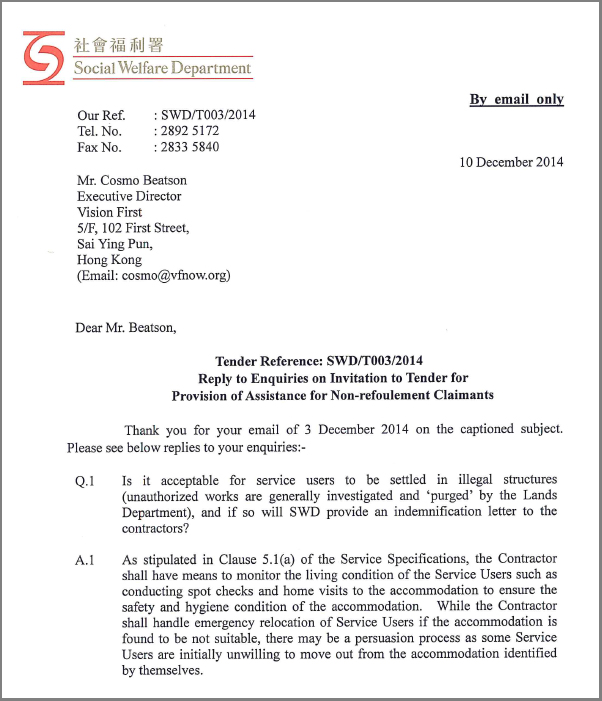
Twenty-one years of duplicity
Dec 23rd, 2013 | Advocacy, Immigration, VF Opinion | Comment
The Convention Against Torture has been extended to Hong Kong since 1992. Article 3(1) of that Convention provides that “no State Party shall expel, return or extradite a person to another State where there are substantial grounds for believing that he would be in danger of being subjected to torture”.
Bound by this convention by choice – it should be noted – Hong Kong offers non-refoulement protection to claimants who subsequently enjoy an absolute right not to be removed pending the outcome of their claims. This protection is unequivocally coupled with social welfare rights, as claimants are not allowed to take up employment as they await decisions.
Under the enhanced torture screening system launched in December 2009, the Immigration Department has recognized 10 victims of torture – including four children, two born in Hong Kong (who would have been citizens in other jurisdictions). One successful claim in the previous system takes the total to 11 screened-in claimants out of 13000 in 21 years.
Hong Kong’s acceptance rate is .1% over two decades
compared to 20-40% yearly in developed countries.
The results are exceedingly eloquent. This risible percentage attests to a covert and unconstitutional Culture of Rejection that complies with the letter of the Immigration Ordinance (establishing an asylum process), while flouting the spirit of the Torture Convention (granting actual protection). The dislocation between administration and jurisprudence is complete and plain for all to see. How long will this duplicity last?
Until demonstrable changes are introduced and protection rates rise to, say, 5%, nobody will be under the illusion that goals other than protection motivated the ratification of this treaty. In the wake of such blatant, persistent hypocrisy, wouldn’t it be more honorable to rescind the Torture Convention? Why not withdraw gracefully, grant citizenship to existing claimants and slam the door shut? What is dysfunctional should be challenged and changed.
Regression is rarely desirable, but if the alternative is inflicting pointless suffering on thousands of refugees, then here is a bridge worth burning. Since UNHCR assessments were already legally halted, why not close down Immigration’s Torture Claim Assessment Branch? From a human rights prospective it would be praiseworthy.
In such an epochal shift, a few hundred Immigration officers would be reassigned to meaningful tasks; three-hundred-plus DLS lawyers would lose their bread-and-butter business; some NGOs would have to restrategize; and, crucially, Hong Kong’s acceptance rate would finally hit the dream target of zero-percent!
By contrast, asylum seekers would appreciate the frankness; thousands would get on with their lives; hundreds would seek refuge where the process is taken seriously. Meaninglessly interrupted lives would recommence; distraught families would plan reunions and their children would have a chance in life. At last, the shame asylum policies cast on our city would mercifully end.
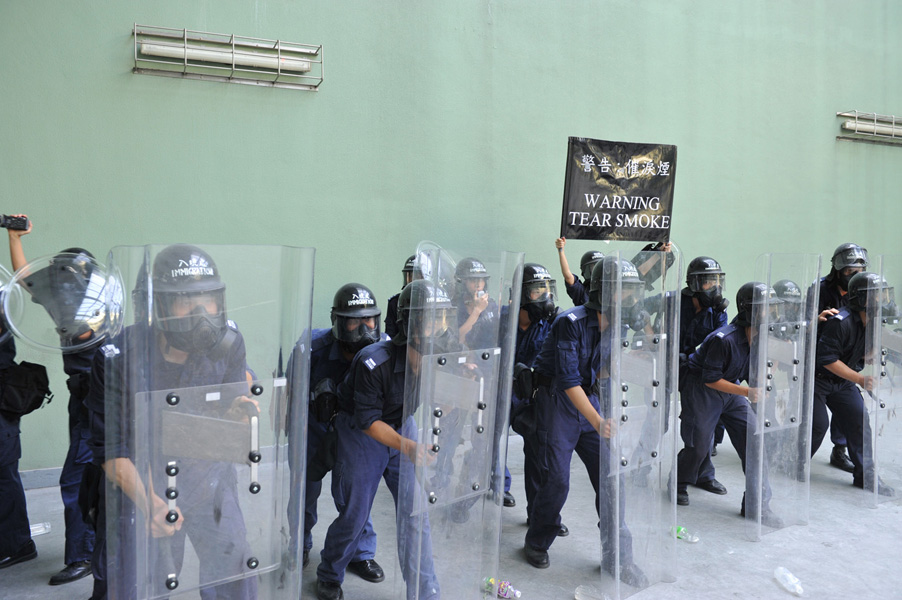
The broken window trap
Nov 1st, 2013 | Crime, Legal, VF Opinion, Welfare | Comment
Recent news of South Asians, supposedly torture claimants, robbing a mother and daughter understandably sparked distrust of and reprobation towards refugees in general, whose poverty and lack of integration mark exclusion from society.
While the violent crime must be condemned and punished, one should be reminded that poverty is inflicted on asylum seekers by unjust policies aimed at preventing social inclusion. The consequences are alienation and detachment from a community that rejected from the start.
Further, it is well known that when people are institutionally prevented from achieving a normal life, depending on their will to escape their circumstances and available opportunities, they may resort to crimes to survive. This direct, causal connection is always worthy of attention.
There is a hint of deception when access to asylum is offered without access to adequate support. Weaker individuals will be tempted by crime, when alternative and realistic means of survival are denied by a failed support system that is less than humanitarian.
It is now recognized that rent allowance and food provisions by SWD-ISS are insufficient. It is outrageous that refugees are plunged into destitution by the very program that aimed to prevent it. From rent to groceries, from electricity bills to cooking gas, from travel cost to phone bills … nothing has changed. Are the covert objectives sinister?
Refugees face dire circumstances that endanger their survival. It is shameful that they are left in destitution only to be condemned when falling to crime – and it should be noted that engaging in unlawful work is a crime. Whether refugees work, steal or sell drugs, they become criminals. Paradoxically, they received lighter sentences selling drugs and stealing, than taking up jobs!
Could this be asylum rejection by entrapment? The situation is not unlike parking expensive cars in ghettos to lure opportunistic thieves. In the “Broken Window Trap”, police place a mobile phone inside a smashed window to make an easy arrest. It’s an effective, but highly questionable sting.
When policies drive persons to commit offenses that they would otherwise have been unlikely to commit – entrapment becomes a possible defense against criminal liability. There is no mitigation for robbing a mother and daughter, yet Hong Kong’s asylum policy is wrought with ethical concerns.
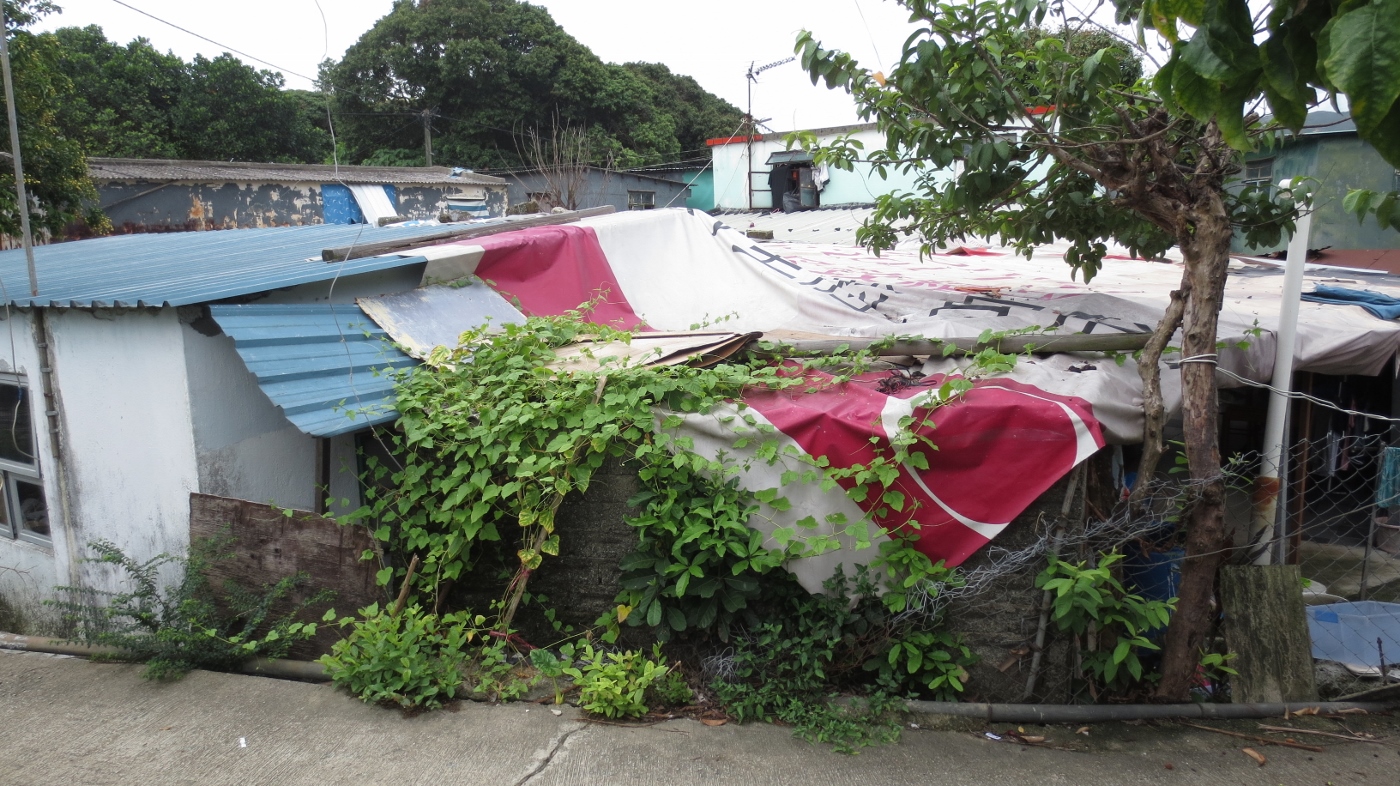
Against the segregation and oppression of refugees
Oct 13th, 2013 | Advocacy, Food, Housing, VF Opinion, Welfare | Comment


